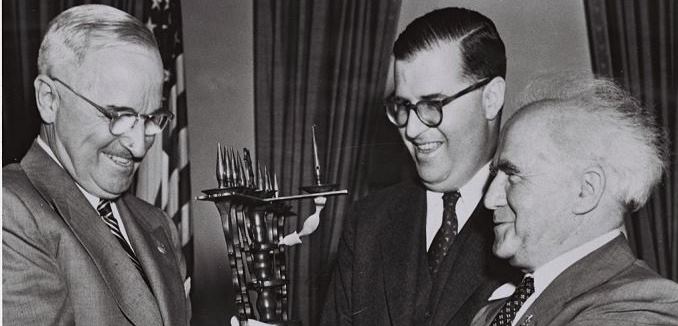In the April 2014 issue of The Tower Magazine, author and scholar, Joshua Muravchik, reviews John B. Judis’s new book Genesis: Truman, American Jews, and the Origins of the Arab/Israeli Conflict. In John B. Judis and the Future of Liberal Support for Israel, Muravchik looks not only at Judis’s premises and mistakes, but also what the publication of the book says about liberal support for Israel. The New Republic, where Judis is an editor, was long a bastion of support for Israel. Judis’s new book, which was excerpted in the magazine, suggests “the loss by Israel’s defenders of a major redoubt.”
Muravchik quotes Judis’s view about Zionism, “In historical terms, the Zionist claim to Palestine had no more validity than the claim by some radical Islamists to a new caliphate.” Judis’s view then doesn’t differ from the article in the Palestinian Charter that states, “[c]laims of historical or religious ties of Jews with Palestine are incompatible with the facts of history.” This a view that is reflected in the recent news that Palestinian President Mahmoud Abbas refuses to recognize Israel as a Jewish state.
Judis’s premise is, in Muravchik’s words, “the existence of Israel is wrong.” Muravchik rejects this and points out the mistakes and biases Judis makes and reveals in constructing his argument that President Truman, against his better judgment, “accede[d] to the Zionists’ pressure—not because he believed in their cause, but because he was worried about Democratic losses in 1946 and again in 1948.”
Muravchik points out a particularly egregious error Judis makes regarding Iraq’s Jews.
In the aftermath of the 1948 war, Judis writes, “Jewish refugees from Iraq and other Arab countries, who became subject to persecution in retaliation for what had been done to the Palestinians, poured into Israel.” But the apogee of this persecution was the pogrom in Baghdad (and other Iraqi cities) on June 1-2, 1941, triggered by Britain’s ouster of the Nazi-allied Rashid Ali, who had seized power a couple of months before. Claiming hundreds of lives, it permanently demolished the security of Iraq’s large and ancient Jewish community. If the perpetrators were motivated but what Jews would do to Palestinian Arabs seven years later, it was apparently revenge in advance.
Muravchik also offers a particularly strong critique of Judis’s central argument that American policy in the Middle East should be based on “redress” of the injustice done to the Palestinians in the creation of the state of Israel.
In other words, America should base its policies on “redress” of the past rather than consequences for the future. Such insouciance is breathtaking. Assuming, for the sake of argument, that Judis’ claim were true, should peace everywhere be made contingent on “redressing” the countless injustices of the past century? If so, woe unto us all. The accusation of injustice brings us back to the most important claim in Judis’ book, namely that the effect of Zionism was to “screw the Arabs out of a country.” The Arabs, however, got 16 other countries—by minimal count—and would have gotten 17 had they accepted partition of Palestine. Today, they hold enough sway in a handful of other countries of mixed nationality that the League of Arab States numbers 22 members. The Jews, far less numerous than the Arabs, sought one state for themselves in their ancestral homeland, a sliver of land amounting to one or two tenths of one percent of the vast Arab lands. Was it wrong for them to petition the sovereign powers and the League of Nations for this?
It was necessary for Judis to deny the justice of Zionism, and to misconstrue history in order to disparage Truman and his support of the founding of Israel. The question is how strongly does Judis represent the views of liberal American.
Muravchik concludes, comparing the views of Judis, to the views of one time New Republic editor Henry Wallace, who viewed “America as the villain.”
Should the magazine and, much more importantly, the broader liberal world turn from the tradition of Truman to that of Wallace—that is, should it absorb the attitudes of the radical left—Israel will surely get the short end.
[Photo: Fritz Cohen / WikiCommons ]




